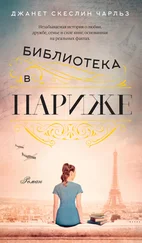Thank you for downloading this Simon & Schuster ebook.
Get a FREE ebook when you join our mailing list. Plus, get updates on new releases, deals, recommended reads, and more from Simon & Schuster. Click below to sign up and see terms and conditions.
CLICK HERE TO SIGN UP
Already a subscriber? Provide your email again so we can register this ebook and send you more of what you like to read. You will continue to receive exclusive offers in your inbox.
For my parents
CHAPTER 1
Odile
PARIS, FEBRUARY 1939
NUMBERS FLOATED ROUND my head like stars. 823. The numbers were the key to a new life. 822. Constellations of hope. 841. In my bedroom late at night, in the morning on the way to get croissants, series after series—810, 840, 890—formed in front of my eyes. They represented freedom, the future. Along with the numbers, I’d studied the history of libraries, going back to the 1500s. In England, while Henry VIII was busy chopping off his wives’ heads, our King François was modernizing his library, which he opened to scholars. His royal collection was the beginning of the Bibliothèque Nationale. Now, at the desk in my bedroom, I prepared for my job interview at the American Library, reviewing my notes one last time: founded in 1920; the first in Paris to let the public into the stacks; subscribers from more than thirty countries, one-fourth of them from France. I held fast to these facts and figures, hoping they’d make me appear qualified to the Directress.
I strode from my family’s apartment on the sooty rue de Rome, across from the Saint-Lazare train station, where locomotives coughed up smoke. The wind whipped my hair, and I tucked tendrils under my tam hat. In the distance, I could see the ebony dome of Saint-Augustin church. Religion, 200. Old Testament, 221. And the New Testament? I waited, but the number wouldn’t come. I was so nervous that I forgot simple facts. I drew my notebook from my purse. Ah, yes, 225. I knew that.
My favorite part of library school had been the Dewey Decimal system. Conceived in 1873 by the American librarian Melvil Dewey, it used ten classes to organize library books on shelves based on subject. There was a number for everything, allowing any reader to find any book in any library. For example, Maman took pride in her 648 (housekeeping). Papa wouldn’t admit it, but he really did enjoy 785 (chamber music). My twin brother was more of a 636.8 person, while I preferred 636.7. (Cats and dogs, respectively.)
I arrived on le grand boulevard , where in the space of a block, the city shrugged off her working-class mantle and donned a mink coat. The coarse smell of coal dissipated, replaced by the honeyed jasmine of Joy, worn by women delighting in the window display of Nina Ricci’s dresses and Kislav green leather gloves. Farther along, I wound around musicians exiting the shop that sold wrinkled sheet music, past the baroque building with the blue door, and turned the corner, onto a narrow side street. I knew the way by heart.
I loved Paris, a city with secrets. Like book covers, some leather, some cloth, each Parisian door led to an unexpected world. A courtyard could contain a knot of bicycles or a plump concierge armed with a broom. In the case of the Library, the massive wooden door opened to a secret garden. Bordered by petunias on one side, lawn on the other, the white pebbled path led to the brick-and-stone mansion. I crossed the threshold, beneath French and American flags flittering side by side, and hung my jacket on the rickety coatrack. Breathing in the best smell in the world—a mélange of the mossy scent of musty books and crisp newspaper pages—I felt as if I’d come home.
A few minutes early for the interview, I skirted the circulation desk, where the always debonair librarian listened to subscribers (“Where can a fella find a decent steak in Paris?” asked a newcomer in cowboy boots. “Why should I pay the fine when I didn’t even finish the book?” demanded cantankerous Madame Simon), and entered the quiet of the cozy reading room.
At a table near the French windows, Professor Cohen read the paper, a jaunty peacock feather tucked in her chignon; Mr. Pryce-Jones pondered Time as he puffed on his pipe. Ordinarily, I would have said hello, but nervous about my interview, I sought refuge in my favorite section of the stacks. I loved being surrounded by stories, some as old as time, others published just last month.
I thought I might check out a novel for my brother. More and more now, at all hours of the night, I would wake to the sound of him typing his tracts. If Rémy wasn’t writing articles about how France should aid the refugees driven out of Spain by the civil war, he was insisting that Hitler would take over Europe the way he’d taken a chunk of Czechoslovakia. The only thing that made Rémy forget his worries—which was to say the worries of others—was a good book.
I ran my fingers along the spines. Choosing one, I opened to a random passage. I never judged a book by its beginning. It felt like the first and last date I’d once had, both of us smiling too brightly. No, I opened to a page in the middle, where the author wasn’t trying to impress me. “There are darknesses in life and there are lights,” I read. “You are one of the lights, the light of all light.” Oui. Merci , Mr. Stoker. This is what I would say to Rémy if I could.
Now I was late. I hurried to the circulation desk, where I signed the card and slid Dracula into my purse. The Directress was waiting. As always, her chestnut hair was swept up in a bun, a silver pen poised in her hand.
Everyone knew of Miss Reeder. She wrote articles for newspapers and dazzled on the radio, inviting all to the Library—students, teachers, soldiers, foreigners, and French. She was adamant that there be a place here for everyone.
“I’m Odile Souchet. Sorry to be late. I was early, and I opened a book…”
“Reading is dangerous,” Miss Reeder said with a knowing smile. “Let’s go to my office.”
I followed her through the reading room, where subscribers in smart suits lowered their newspapers to get a better look at the famous Directress, up the spiral staircase and down a corridor in the sacred “Employees Only” wing to her office, which smelled of coffee. On the wall hung a large aerial photo of a city, its blocks like a chessboard, so different from Paris’s winding streets.
Noting my interest, she said, “That’s Washington, DC. I used to work at the Library of Congress.” She gestured for me to be seated and sat at her desk, which was covered by papers—some trying to sneak out of the tray, others held in place by a hole puncher. In the corner was a shiny black phone. Beside Miss Reeder, a chair held a batch of books. I spied novels by Isak Dinesen and Edith Wharton. A bookmark—a bright ribbon, really—beckoned from each, inviting the Directress to return.
What kind of reader was Miss Reeder? Unlike me, she’d never leave books open-faced for a lack of a marque-page . She’d never leave them piled under her bed. She would have four or five going at once. A book tucked in her purse for bus rides across the city. One that a dear friend had asked her opinion about. Another that no one would ever know about, a secret pleasure for a rainy Sunday afternoon—
“Who’s your favorite author?” Miss Reeder asked.
Who’s your favorite author? An impossible question. How could a person choose only one? In fact, my aunt Caro and I had created categories—dead authors, alive ones, foreign, French, etc.—to avoid having to decide. I considered the books in the reading room I’d touched just a moment ago, books that had touched me. I admired Ralph Waldo Emerson’s way of thinking: I am not solitary whilst I read and write, though nobody is with me , as well as Jane Austen’s. Though the authoress wrote in the nineteenth century, the situation for many of today’s women remained the same: futures determined by whom they married. Three months ago, when I’d informed my parents that I didn’t need a husband, Papa snorted and began bringing a different work subordinate to every Sunday lunch. Like the turkey Maman trussed and sprinkled with parsley, Papa presented each one on a platter: “Marc has never missed a day of work, not even when he had the flu!”
Читать дальше
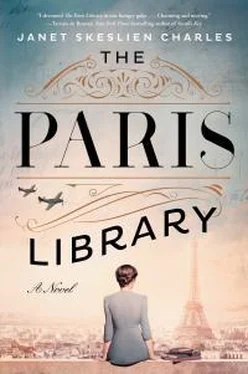
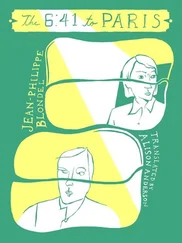

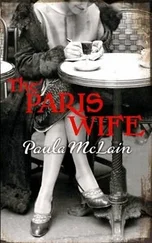


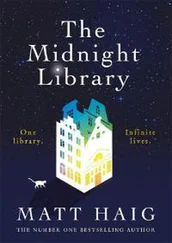
![Джанет Скеслин Чарльз - Библиотека в Париже [litres]](/books/391555/dzhanet-skeslin-charlz-biblioteka-v-parizhe-litres-thumb.webp)
